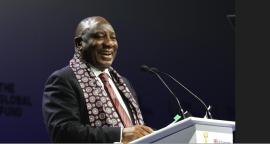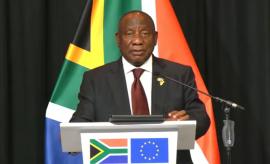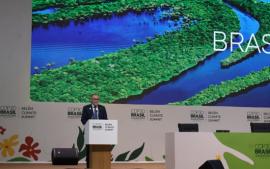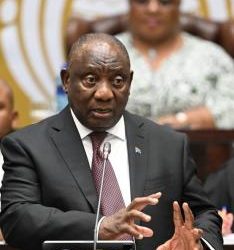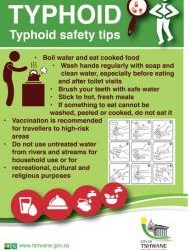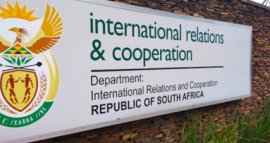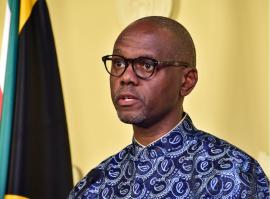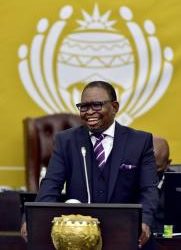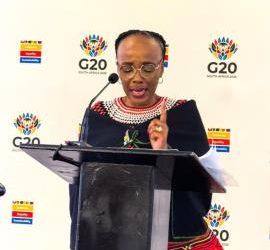President Cyril Ramaphosa says Africa’s rising trajectory and growing global influence must be matched by stronger continental cooperation to drive the economic growth needed for lasting development.
“Deepening our economic cooperation is essential for continental development and integration, building our resilience and self-reliance. It is imperative that we build deeper collaboration and resilience within and between our countries,” the President said on Friday in Johannesburg.
Addressing a working dinner for African Heads of State and Government, Ramaphosa emphasised that investment and trade expansion must be at the centre of Africa’s economic engagements, particularly in the face of unilateral trade actions, tariffs and erosion of World Trade Organization (WTO) rules.
“Four days ago, I met with senior executives from South African companies with investments across the continent. Many of them outlined plans to substantially increase their investments across the continent. That is a clear demonstration that indeed Africa is on the rise as our companies are now moving forward to invest across our various countries on the continent,” the President said.
According to Ramaphosa, countries trading under the African Continental Free Trade Area (AfCFTA) preferences are already seeing the benefits.
AfCFTA is a free trade agreement that aims to create a single, integrated continental market for goods and services across 55 member states of the African Union.
“At the same time, we know of companies from elsewhere on the continent that are invested and intend to invest in South Africa. These are links that we must nurture and encourage if we are to realise our continent’s potential.
“To strengthen these trade and investment links, I plan to host a Pan African Investment Conference in 2026, where African companies can showcase their investments in other countries and outline their future investment plans,” the President said.
G20 Presidency
While presiding over the G20 Presidency, South Africa sought to position Africa as a vital partner in advancing equitable development.
“South Africa correctly felt that we need to put the interests of our continent on the global platform. By harnessing our collective strengths, we do believe that we can continue to highlight the many issues that the African continent wants the world to address. We are convinced that our beloved continent can overcome its challenges and become a leader in prosperity and development,” Ramaphosa said.
South Africa has used the international forum to advance priorities such as disaster resilience, debt sustainability, finance for just energy transitions and harnessing critical minerals for inclusive growth.
“We established an Africa expert panel to reinforce Africa’s voice on debt sustainability, the cost of capital and financing for productive investments. We’re encouraged by the ministerial declaration on debt sustainability, which outlines a clear acknowledgement of the growing debt burden on African countries and provides a basis for concrete action.
“We must work together to ensure that the commitments in this declaration, including to strengthen implementation of the common framework and extend support to countries facing liquidity challenges, are translated into meaningful action,” the Presidency said.
Furthermore, the G20 Presidency secured the agreement on the G20 Africa engagement framework, which will enable a continued focus on the G20 finance track, on the issues that matter most to Africa over the next five years.
“By advocating for Africa’s interests globally, we have sought to ensure that the continent’s voice is heard on climate change, on the issue of debt, on trade and humanitarian assistance. Fair trade, inclusive prosperity, reformed global governance and multilateralism are fundamental to our vision for a more equal world,” the President said.
For its G20 Presidency, South Africa embraced the theme “Solidarity, Equality, Sustainability” .
Heads of State and Government from the world’s largest economies meet annually at the G20 Leaders’ Summit to discuss and coordinate on major global issues.
This year, they will gather in Johannesburg on Saturday and Sunday.
G20 members include the world’s major economies, representing 85% of global GDP, 75% of international trade, and two-thirds of the world’s population.
The G20 comprises 19 countries (Argentina, Australia, Brazil, Canada, China, France, Germany, India, Indonesia, Italy, Japan, Republic of Korea, Mexico, Russia, Saudi Arabia, South Africa, Türkiye, the United Kingdom, and the United States), the European Union, and since 2023, the African Union. – SAnews.gov.za

